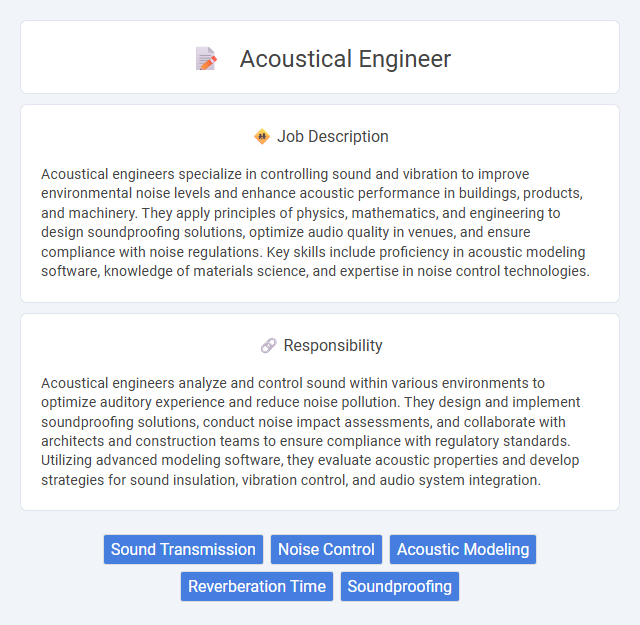
Acoustical engineers specialize in controlling sound and vibration to improve environmental noise levels and enhance acoustic performance in buildings, products, and machinery. They apply principles of physics, mathematics, and engineering to design soundproofing solutions, optimize audio quality in venues, and ensure compliance with noise regulations. Key skills include proficiency in acoustic modeling software, knowledge of materials science, and expertise in noise control technologies.
Individuals who are detail-oriented and possess strong analytical skills are likely to thrive as acoustical engineers. Those comfortable working with complex mathematical models and acoustic measurement tools may find this career suitable. People preferring collaborative projects and problem-solving in controlled, technical environments probably align well with the demands of this profession.
Qualification
Acoustical Engineers typically hold a bachelor's degree in acoustical engineering, mechanical engineering, or a related field, with many employers preferring candidates who possess a master's degree or higher specialization. Proficiency in acoustic modeling software, sound measurement tools, and knowledge of building codes and noise control regulations are essential qualifications. Strong analytical skills, experience with environmental noise assessments, and certifications such as Board Certified in Acoustics (BCA) enhance employability in this specialized engineering sector.
Responsibility
Acoustical engineers analyze and control sound within various environments to optimize auditory experience and reduce noise pollution. They design and implement soundproofing solutions, conduct noise impact assessments, and collaborate with architects and construction teams to ensure compliance with regulatory standards. Utilizing advanced modeling software, they evaluate acoustic properties and develop strategies for sound insulation, vibration control, and audio system integration.
Benefit
Acoustical engineering jobs probably offer significant benefits such as competitive salaries and opportunities to work on diverse projects across industries like construction, entertainment, and environmental consulting. Employees in this field may enjoy access to advanced technology and continuous professional development, enhancing career growth and expertise. There is likely a strong demand for acoustical engineers, which could lead to job stability and potential for advancement.
Challenge
Acoustical engineering likely involves solving complex problems related to sound and vibration control in various environments. Professionals in this field may frequently encounter challenges such as designing spaces with optimal sound quality or mitigating noise pollution in urban areas. Adapting to evolving technologies and regulations could also present ongoing difficulties in accomplishing project goals.
Career Advancement
Acoustical engineers with expertise in noise control, sound design, and building acoustics experience significant career advancement by developing specialized skills in environmental acoustics and audio technology. Progression often leads to roles such as senior acoustical consultant, project manager, or research specialist within engineering firms or government agencies. Professional certifications like INCE or memberships in organizations such as the Acoustical Society of America enhance credibility and open opportunities for leadership positions.
Key Terms
Sound Transmission
Acoustical engineers specializing in sound transmission analyze and control how sound travels through various materials and structures to minimize noise pollution and enhance acoustic comfort. They use advanced modeling software and measurement tools to design barriers, insulation, and building components that effectively reduce sound transmission. Their expertise is critical in industries such as construction, automotive, and urban planning to ensure compliance with noise regulations and improve environmental acoustics.
Noise Control
Acoustical engineers specializing in noise control design and implement solutions to reduce unwanted sound in environments such as industrial facilities, transportation systems, and residential areas. They use advanced modeling software and measurement tools to analyze sound propagation and develop materials or structural modifications that minimize noise pollution. Mastery of regulations like OSHA noise standards and expertise in vibration isolation techniques are critical for effective noise control engineering.
Acoustic Modeling
Acoustical Engineers specializing in acoustic modeling use advanced software tools like EASE and ODEON to simulate sound propagation and optimize noise control in various environments. They analyze architectural spaces, industrial settings, and urban areas to predict acoustic performance and enhance sound quality. Expertise in signal processing, auditory perception, and environmental acoustics is essential for designing effective noise mitigation and sound reinforcement strategies.
Reverberation Time
Reverberation time is a critical parameter that acoustical engineers analyze to optimize sound quality within various environments, from concert halls to recording studios. Accurate measurement and control of reverberation time directly influence speech intelligibility, music clarity, and overall acoustic comfort. Utilizing advanced modeling software and field measurements, acoustical engineers design tailored solutions to balance absorption and reflection properties, ensuring optimal reverberant characteristics for each specific space.
Soundproofing
Acoustical engineers specializing in soundproofing design and implement solutions to minimize noise pollution in residential, commercial, and industrial settings. They use advanced materials, acoustic modeling software, and construction techniques to control sound transmission and improve auditory comfort. Expertise in evaluating environmental noise levels and adhering to regulatory standards ensures effective noise mitigation and compliance.
 kuljobs.com
kuljobs.com